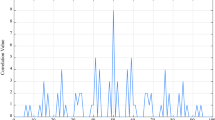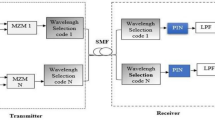Abstract
This paper presents a simple and efficient multiple access interference (MAI) cancelation technique in optical code division multiple access (OCDMA) system. The proposed technique is based on hybrid frequency shift keying (FSK) with an enhanced modified prime code as a signature sequence for coding techniques. Coherent FSK modulation along with incoherent demodulation using Arrayed-Waveguide Grating has been examined in the transceiver structure. In the proposed technique, a reference signal is constructed by using one of the addressed spreading sequences, and MAI cancelation is performed by subtracting the reference signal from the received signal of the desired user. The performance of the proposed FSK-OCDMA system is compared with the performance of the existing pulse position modulation (PPM)–OCDMA system. The simulation results reveal that the bit-error rate performance of the proposed technique is superior to the performance of the pulse position modulation (PPM) technique. Also, the results indicate that the proposed technique is very power efficient, and when the bit rate is constant, the network capacity can be expanded to accommodate a large number of simultaneous active users with low error rate. Moreover, the proposed technique simplifies the hardware of the receiver design.














Similar content being viewed by others
References
Majumder, S.P., Azhari, A., Abbou, F.M.: Impact of fiber chromatic dispersion on the BER performance of an optical CDMA IM/DD transmission system. IEEE Photon. Technol Lett. 17(6) (2005)
Salehi, J.A., Brackett, C.A.: Code division multiple access techniques in optical fiber network–part II: system performance analysis. IEEE Trans. Commun. 37, 834–842 (1989)
Goursaud, C., Julien-Vergonjanne, A., Aupetit-Berthelemot, C., Cances, J.P., Dumas, J.M.: Study of parallel interference cancellation structures for incoherent DS—OCDMA systems. Asia-Pacific Conference on Communication (Oct 2005)
Kwong, W.C., Perrier, P.A., Prucnal, P.R.: Performance comparison of asynchronous and synchronous code-division multiple access techniques for fiber optic local area networks. IEEE Trans. Commun. 39(11), 1625–1634 (1991)
Iversen, K., et al.: M-ary FSK signaling for incoherent all-optical CDMA networks. In: IEEE Globe Com, vol. 3, pp. 1920–1924. Berlin GmbH, Germany (1996)
Lemieux, J.F., et al.: Step-tunable (100GHz) hybrid laser based on Vernier effect between Fabry-Perot cavity and sampled fibre Bragg grating. Electron. Lett. 35(11), 904–906 (1999)
Schröder, J., et al.: Passively mode-locked Raman fiber laser with 100 GHz repetition rate. Opt. Lett. 31(23), 3489–3491 (2006)
Yang, C.C.: Optical CDMA-based passive optical network using arrayed waveguide-grating. In: IEEE Int. Conf. on Communications, Circuits Systems, vol. 3, pp. 1846–1850. Kun Shan University, Tainan (2006)
Gamachi, Y., et al.: An optical synchronous M-array FSK/CDMA system using interference canceller. J. Electron. Commun. Jpn. 83(9), 20–32 (2000)
Shalaby, H.M.H.: Chip-level detection in optical code division multiple access. J. Lightwave Technol. 16(6), 1077–1087 (1998)
Shalaby, H.M.H.: Co channel interference reduction in optical PPM-CDMA systems. IEEE Trans. Commun. 46(6), 799–805 (1998)
Attia, G., El Dokany, I., Mohamed, A.: Trade off between a proposed FSK and PPM schemes for MAI cancellation in OCDMA systems. In: 2011 28th National Radio Science Conference (NRSC) (2011)
Author information
Authors and Affiliations
Corresponding author
Rights and permissions
About this article
Cite this article
Hussein, G.A., Mohamed, A.EN.A., Oraby, O.A. et al. Multiple access interference cancelation technique in optical CDMA systems. Photon Netw Commun 26, 74–83 (2013). https://doi.org/10.1007/s11107-013-0410-6
Received:
Accepted:
Published:
Issue Date:
DOI: https://doi.org/10.1007/s11107-013-0410-6




